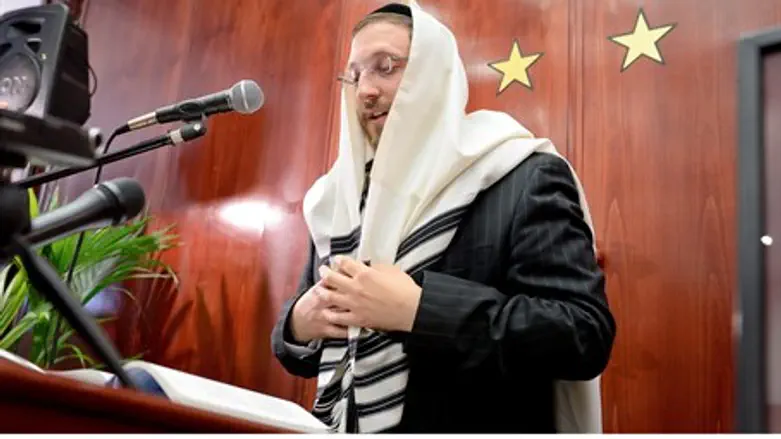
European diplomats joined Jewish and other religious leaders Wednesday for a ceremony marking 30 days since the murder of four people at the Jewish Museum in Brussels.
Officials at the memorial ceremony - organized by the European Jewish Association (EJA) and the European Jewish Community Centre (EJCC) - included acting European Parliament President Gianni Pittella, Belgian Minister of Foreign Affairs and Deputy Prime Minister Didier Reynder, and ambassadors to the European Union from more than 15 countries.
Muslim community leaders joined their Jewish counterparts as well in a show of solidarity. The man suspected of carrying out the attack, Mehdi Nemmouche, is a French Muslim extremist, who fought for a period alongside the jihadi Islamic State of Iraq and the Levant (ISIS) in Syria.
The 29-year-old Islamist was arrested six days later in the French city of Marseille on a routine check, and is currently planning to appeal his extradition to Belgium to face trial.
Nehama Tawil, program director for the European Jewish Community Centre, opened the ceremony by saying that "Today is a sad day, not just for the Jewish community but for the entire Europe," but added that "it is heartwarming to see such a positive response from politicians to come and show solidarity."
More needs to be done
Speaking to those in attendance, acting EU Parliament head Gianni Pittela echoed those sentiments somewhat, and said the attack served as a reminder that "racism and anti-Semitism are still alive" in Europe.
"It was a crime against our values as Europeans, carried out in the capital of Europe in a house of memory and culture," Pittela said. "Justice must be served."
"The EU must eradicate any form of anti-Semitism and xenophobia. We must strive to serve all our citizens and most importantly to give our citizens to live in security," he added.
Belgian Minister of Foreign Affairs Didier Reynders - who was one of the first at the scene following the shooting attack - said he felt personally effected by the murders, and added that the fact that it was motivated by anti-Semitism made it all the worse.
"The fact that communities and beliefs are being targeted makes the unbearable even more revolting, " said Reynders.
"We need to further develop Human rights and role of law which are at the core of our civilizations," he added, emphasizing the need to intensify the fight against hate speech and to work together with European partners.
Rabbi Menachem Margolin, General Director of the European Jewish Association, urged action from the European governments, noting that anti-Semitism has become so commonplace that the insult "Dirty Jew" is now heard every day in the street and demanding a concerted effort to fight Jew-hatred in Europe.
Deploring that 70 years after the Holocaust "we still need to fight against anti-Semitism", Rabbi Margolin cited a recent study by the European Fundamental Rights Agency, which revealed alarming rates of anti-Semitism, including that 40% of Jews in France are hiding their Judaism out of fear of attack. He called on European governments "to set up an official special authority to fight against anti- Semitism".
"Only this authority will ensure full security to all Jews, to prosecute perpetrators and to ensure that education on anti-Semitism and on the Holocaust would be included in school curricula," he said. "It is only with action that we can secure the future of the Jewish people in Europe."
Following the attacks, several prominent Jewish leaders leveled harsh criticism at European governments for not taking anti-Semitism seriously enough.
Also present at the ceremony was Muslim community leader Khalid Hajji, President of the European Council of Moroccan Ulemas, who stated that "some forms of religiosity must be abolished". Religion must be the basis for better communication, not violent extremism and intolerance, he added, as he urged parties to come together "to build a better future."
Philippe Markiewicz, who chairs the Brussels Jewish community, said that the deadly attack did not affect just his community but all Jewish communities, and lamented the fact that Islamists and other extremists were exporting the Middle East conflict to the streets of Europe.
"We are out of this conflict," he said. "The education of our youth is paramount, the fight against anti-Semitism and racism pass first though the education of youth - literature and history are important, but first of all it is important to be a good citizen," he added.
After the speeches the Jewish memorial prayer of Kaddish was recited and each of the five speakers lit a candle in memory of the victims.
Four people were murdered in the attack on May 24th: Israeli couple Emanuel and Miriam Riva, who were visiting the country as tourists; Alexandre Strens, a Belgian employee at the museum, whose father is Muslim and mother is Jewish; and Dominique Sabrier, a French citizen who volunteered at the museum.
Credit all pictures: European Jewish Association.